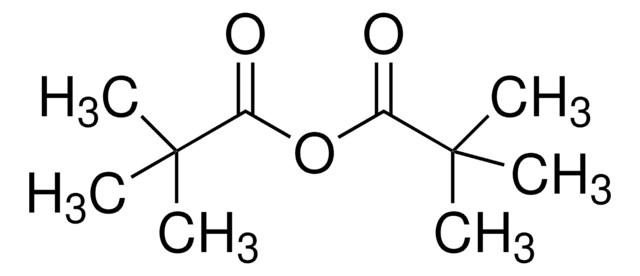Wichtige Dokumente
245771
Isobuttersäureanhydrid
97%
Synonym(e):
2-Methylpropionsäureanhydrid
About This Item
Empfohlene Produkte
Dampfdichte
5.45 (vs air)
Qualitätsniveau
Dampfdruck
10 mmHg ( 67 °C)
Assay
97%
Form
liquid
Selbstzündungstemp.
624 °F
Expl.-Gr.
1.09 %, 87 °F
7.7 %, 127 °F
Brechungsindex
n20/D 1.406 (lit.)
bp
182 °C (lit.)
mp (Schmelzpunkt)
−56 °C (lit.)
Dichte
0.954 g/mL at 25 °C (lit.)
Funktionelle Gruppe
anhydride
ester
SMILES String
CC(C)C(=O)OC(=O)C(C)C
InChI
1S/C8H14O3/c1-5(2)7(9)11-8(10)6(3)4/h5-6H,1-4H3
InChIKey
LSACYLWPPQLVSM-UHFFFAOYSA-N
Suchen Sie nach ähnlichen Produkten? Aufrufen Leitfaden zum Produktvergleich
Verwandte Kategorien
Allgemeine Beschreibung
Anwendung
Signalwort
Danger
H-Sätze
Gefahreneinstufungen
Acute Tox. 3 Dermal - Acute Tox. 3 Oral - Skin Corr. 1B
Lagerklassenschlüssel
6.1A - Combustible acute toxic Cat. 1 and 2 / very toxic hazardous materials
WGK
WGK 3
Flammpunkt (°F)
154.4 °F - closed cup
Flammpunkt (°C)
68 °C - closed cup
Persönliche Schutzausrüstung
Eyeshields, Faceshields, Gloves, type ABEK (EN14387) respirator filter
Hier finden Sie alle aktuellen Versionen:
Besitzen Sie dieses Produkt bereits?
In der Dokumentenbibliothek finden Sie die Dokumentation zu den Produkten, die Sie kürzlich erworben haben.
Kunden haben sich ebenfalls angesehen
Unser Team von Wissenschaftlern verfügt über Erfahrung in allen Forschungsbereichen einschließlich Life Science, Materialwissenschaften, chemischer Synthese, Chromatographie, Analytik und vielen mehr..
Setzen Sie sich mit dem technischen Dienst in Verbindung.






![1,8-Diazabicyclo[5.4.0]undec-7-en (1,5-5) 98%](/deepweb/assets/sigmaaldrich/product/structures/120/564/5b373e23-1624-489c-8efb-692de0f96ffb/640/5b373e23-1624-489c-8efb-692de0f96ffb.png)







